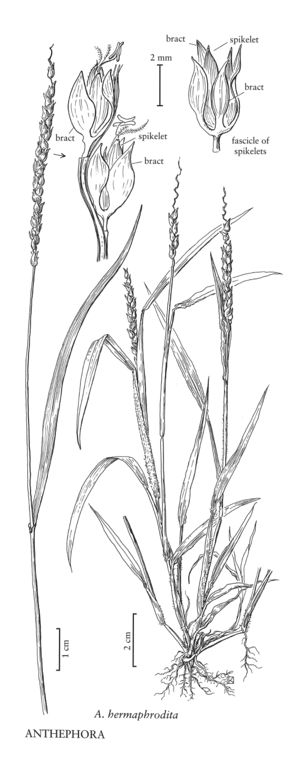Difference between revisions of "Anthephora hermaphrodita"
imported>Volume Importer |
imported>Volume Importer |
||
| Line 43: | Line 43: | ||
|publication year= | |publication year= | ||
|special status=Introduced | |special status=Introduced | ||
| − | |source xml=https://bitbucket.org/aafc-mbb/fna-data-curation/src/ | + | |source xml=https://bitbucket.org/aafc-mbb/fna-data-curation/src/200273ad09963decb8fc72550212de541d86569d/coarse_grained_fna_xml/V25/V25_1382.xml |
|subfamily=Poaceae subfam. Panicoideae | |subfamily=Poaceae subfam. Panicoideae | ||
|tribe=Poaceae tribe Paniceae | |tribe=Poaceae tribe Paniceae | ||
Latest revision as of 18:56, 11 May 2021
Plants annual. Culms erect or decumbent, sometimes rooting at the lower nodes, branching from the base. Sheaths densely to sparsely pubescent, hairs papillose-based; ligules 1.5-3 mm, brownish, entire or dentate, not ciliate; blades 4-17 cm long, 2-8 mm wide, flat, pubescent on both surfaces. Panicles 4-12 cm long, 5-8 mm wide, with 20-60 fascicles; fascicles 5-7.5 mm; bracts 4-7 mm, scabrous. Fertile spikelets 3.5-4.5 mm, ovoid, scabrid between the veins, acute; upper lemmas 3.7-4 mm, glabrous, margins overlapping the edges of the palea. Caryopses about 2 mm. 2n = 18.
Distribution
Puerto Rico, Virgin Islands, Pacific Islands (Hawaii), Fla.
Discussion
Anthephora hermaphrodita is a weedy species, native to maritime beaches, lowland pastures, and disturbed areas from Mexico and the Caribbean Islands to Peru and Brazil. It is now established in Alachua County, Florida, having escaped from plantings at the Experiment Station of the University of Florida, Gainesville.
Selected References
None.
